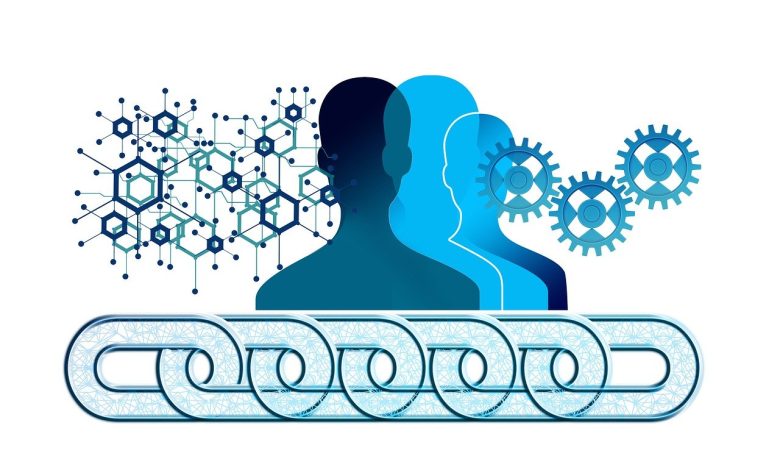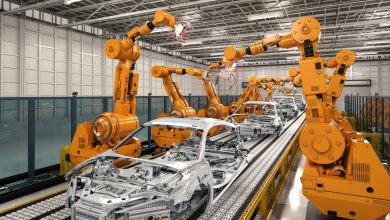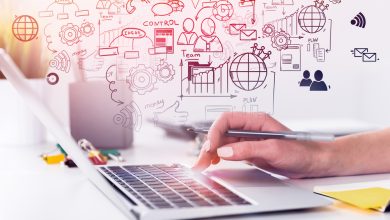Blockchain With AI: The Way Forward

Blockchain is a distributed, unchangeable database that allows numerous parties to communicate encrypted data in real time as they initiate and finish transactions. A blockchain network can keep track of orders, payments, accounts, production, and other things. Permissioned members gain confidence and trust in their dealings with other firms, as well as new efficiency and opportunities, because they share a single vision of the truth.
Artificial Intelligence uses computers, data, and sometimes machines to simulate the human mind’s problem-solving and decision-making abilities. It also encompasses the subfields of machine learning and deep learning, which use AI algorithms that have been trained on data to make predictions or classifications and learn as they go. Task automation, better decision making, and a better customer experience are all advantages of AI.
Blockchain and AI Values Combined
1. Authenticity
Blockchain’s digital record provides visibility into the framework behind AI as well as the origin of the data it employs, thereby tackling the difficulty of explainable AI. This increases trust in data integrity and, by extension, trust in AI suggestions. The use of blockchain to store and disseminate AI models creates an audit trail, and the combination of blockchain with AI can improve data security.
2. Augmentation
AI can read, understand, and correlate data at breakneck speed, providing a new level of intelligence to blockchain-based business networks. Blockchain enables AI to scale to give more meaningful insights, regulate data usage and model sharing, and establish a trustworthy and transparent data economy by enabling access to vast volumes of data from within and outside the company.
3. Automation
AI, automation, and blockchain can provide new value to multi-party business operations by removing friction, boosting speed, and enhancing efficiency. For example, AI algorithms integrated in smart contracts implemented on a blockchain can recommend expired products for recall, conduct transactions depending on set criteria and events, such as re-orders, payments, or stock acquisitions, arbitrate disputes, and choose the most sustainable transport route. You can hire IT professionals who have good knowledge of both these technologies if you are looking to develop a project.
Blockchain with AI Use Cases
Bringing AI into blockchain creates new potential across businesses.
1. Healthcare
From disclosing therapeutic findings and fulfilling user requests to discovering insights from patient data and displaying patterns, AI may help grow nearly every discipline in healthcare. By storing patient data on the blockchain, including electronic health records, organizations may collaborate to improve care while maintaining patient privacy.
2. Life sciences
In the pharmaceutical industry, blockchain and AI can increase drug supply chain visibility and traceability while dramatically increasing clinical trial success rates. Combining current data analysis with a decentralized clinical trial framework provides data integrity, transparency, patient tracking, permission management, trial participation and data collection automation, and trial participation and data collection automation.
3. Supply chain
AI and blockchain are transforming supply chains across industries and creating new opportunities by digitizing a largely paper-based process, making data more shareable and trustworthy, and adding intelligence and automation to transaction processing. For example, a corporation can assess carbon emissions data at the product or component level, adding precision and insight to decarbonization initiatives.
Interconnection of Blockchain Technology and Artificial Intelligence
In many respects, blockchain technology is intertwined with AI. The following are the key integrations:
1. Transparent data source
A large amount of data is required to train an AI application. Blockchain is a dependable source of improved data since it is the most transparent technology. The source of data may be quickly confirmed due to the traceability of nodes.
2. Autonomous system
The decentralized ledger technology assures that no single server handles all of the AI application’s operations. The autonomous system drives decentralization in order to manage AI training and operations without supervision.
3. Privacy protection
Cryptographic techniques provide privacy across the network that supports AI training and operations. When you have a strong privacy system in place, you can train and supply AI systems, which are more competitive and complicated.
4. Distributed computing power
It takes a lot of firepowers to train and sustain AI. Blockchain technology assumes that role and assists in navigating it. It also considers space requirements such as hardware and software, storage, and maintenance costs.
5. Security
Smart contracts on the blockchain are insufficiently secure. The blockchain depends on the contract’s rigidity; if there are flaws, you can easily abuse them and destroy the apps. AI is utilized to develop more secure and smart contracts in order to reduce such vulnerabilities.
6. Reading efficiency
Because blockchains have constraints in their data storage options, they frequently have low query performance. With level DB-a write-intensive DMS, blockchain applications sacrifice reading efficiency in order to achieve a more write-intensive approach.
When applying AI, data storage strategies help to improve blockchain usage. A unique TTA-CB protocol suggested reduces data storage difficulties using PSO algorithms. When rigorous testing and training are performed, AI eventually aids in improving the speed of data queries.
7. Authenticity
The digital record of blockchain provides insights into the AI framework and the provenance of the data used; it also tackles the issues of explainable AI. It aids in increasing your trust in data integrity and AI recommendations. When using blockchain to store and distribute AI modes, it gives an audit trail and combines blockchain and AI to improve data security.
8. Augmentation
AI reads data thoroughly and quickly. It also understands and processes data quickly by delivering greater intelligence to blockchain-based business networks. When larger data sets are made available within or outside of businesses, blockchain will assist AI in scaling and providing more actionable insights, managing model sharing, and data usage, and creating a transparent and trustworthy data economy.
9. Automation
Automation, artificial intelligence, and blockchain will provide novel values to corporate processes that involve multiple stakeholders, such as adding, removing friction, and enhancing speed and efficiency. AI models incorporated in smart contracts run on blockchain to adjudicate disputes and choose the most environmentally friendly transportation ways.
Rundown
When you mix artificial intelligence and blockchain, you may create an immutable, secure, and decentralized system. This strategy will result in significant data and information security breakthroughs in a variety of businesses. Manpower outsourcing companies can help you here in finding some good developers.
However, the intersection of artificial intelligence and blockchain technology remains unexplored. Despite the fact that the merging of the two technologies has received a lot of attention. Projects are also being dedicated to the ground-breaking combination that is accessible. When the two technologies are combined, data can be used in previously inconceivable ways.
Because each of these technologies affects and executes data in unique ways, their collaboration will provide a reasonable explanation. It has the ability to raise the bar for data exploitation.
A must-read: Future Trends of HR Outsourcing




